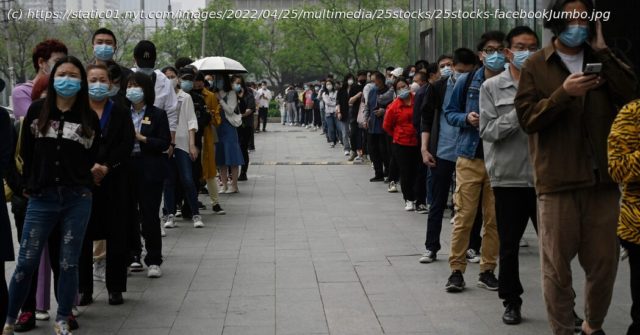A coronavirus outbreak in Beijing is spooking investors worried about the potential hit to the global economy.
A coronavirus outbreak in Beijing is spooking investors worried about the potential hit to the global economy. By Jason Karaian and Kevin Granville Global stocks fell on Monday on fears that a coronavirus outbreak in Beijing could lead to broader lockdowns in China, which would have a negative effect on the world economy. Commodities like oil also fell in anticipation that stringent new restrictions would depress growth and exports in the world’s second-largest economy. Wall Street was pointed toward a drop when trading begins, following steep declines in Asian and European stock indexes. The Shanghai composite plummeted 5.1 percent, the index’s biggest daily decline since February 2020, and the Hang Seng in Hong Kong lost 3.7 percent. The tightly controlled Chinese currency, the renminbi, also fell 1 percent versus the U.S. dollar, extending recent losses. The wave of selling continued in Europe, where the Stoxx Europe 600 lost 2.1 percent. Germany’s DAX was 1.7 percent lower. Oil prices were down about 4 percent, with Brent crude trading at $102 a barrel, after reaching nearly $115 a week ago. West Texas Intermediate futures were trading at $97.80 a barrel. The war in Ukraine has reverberated through the global economy, pushing inflation to levels not seen in decades, prompting central banks to raise interest rates. But the latest worries come from China, where the central government has relied on lockdowns of major population and manufacturing areas, in pursuit of the Communist Party leader Xi Jinping’s “zero Covid” strategy of eliminating infections. The Beijing government reported on Monday that 70 coronavirus cases had been found in city since Friday. The district with the highest case numbers ordered all 3.5 million residents to take coronavirus tests in the coming days. In other cities, mass testing has sometimes been a prelude to stringent lockdowns, like the four-week one in Shanghai. The yield on 10-year Treasuries was down six basis points, to about 2.82 percent, another sign of jitters about economic growth. Twitter is nearing a deal to sell itself to Elon Musk, two people with knowledge of the situation said, a move that would unite the world’s richest man with the influential social networking service. An agreement could be announced as soon as Monday, the people told The Times’s Lauren Hirsch, Mike Isaac and Katie Conger. Twitter’s board was negotiating with Mr. Musk into Monday over his unsolicited bid to buy the company, after he began lining up $46.5 billion in financing for the offer last week, said the people, who spoke on the condition of anonymity because they were not authorized to discuss confidential information. The two sides were talking about details including a timeline to close any potential deal and any fees that would be paid if an agreement were signed and then fell apart, they said. The discussions followed a Twitter board meeting on Sunday morning to discuss Mr. Musk’s offer, the people said. Obtaining commitments for the financing was a turning point for how the board viewed Mr. Musk’s bid of $54.20 a share, enabling the company’s 11 board members to seriously consider his offer, the people said. An agreement is not yet final and may still fall apart, but what had initially seemed to be a highly improbable deal appeared to be nearing an endgame. The situation involving Twitter and Mr. Musk remains fluid and fast-moving, the people with knowledge of the situation said. READ THE FULL ARTICLE → The near-instant collapse of CNN+ amounted to one of the most spectacular media failures in years, a $300 million experiment that ended abruptly with layoffs in the offing and careers in disarray. The corporate tug of war over its fate exposed deep philosophical divides about the future of digital media, as executives struggle to navigate a rapidly changing marketplace where technology and consumer habits shift day to day. And it reflected the awkward regulatory dance of two media giants merging even as a high-profile project hurtled toward completion. The Times’s John Koblin, Michael M. Grynbaum and Benjamin Mullin report on the sudden rise and fall of CNN+, based on interviews with a dozen people intimately familiar with the matter, who spoke on condition of anonymity to share the details of sensitive conversations. Discovery, run by David Zaslav for 15 years, had concerns about CNN+. Mr. Zaslav, the chief executive of the newly merged Warner Bros. Discovery, had experienced bad luck with single-topic streaming services as the head of Discovery, where niche platforms dedicated to cars, food and golf were costly and ended in failure. But Discovery was constrained from directly guiding one of its streaming competitors until the deal closed. In late February and again in early March, Andrew Morse, CNN’s chief digital officer, asked if his team could share their vision for CNN+ with Discovery officials before the merger was complete. Both times, the requests were not granted. In transactions between major companies, executives are wary of running afoul of rules precluding “gun-jumping”: coordinating their business activities in the critical days before the deals close.






